Julie Inman Grant, Australia’s pro-censorship and anti-privacy “eSafety Commissioner,” has been criticized and accused of abandoning neutrality after she openly criticized former US President Donald Trump, labeling him a prolific source of “misinformation.”
Speaking at the Royal Society of NSW at Sydney’s Government House, Inman Grant, in her official capacity, described Trump’s online behavior as contributing significantly to the spread of false and misleading information.
“During his presidency, Donald Trump not only savagely abused foes online with impunity, but was identified as a major superspreader of mis- and disinformation,” she declared.
However, legal experts and free speech advocates have voiced concerns about the appropriateness of such pointed remarks by a government official tasked with neutral oversight of online safety.
As reported by Sky News, John Storey, Director of Law and Policy at the Institute of Public Affairs, emphasized that neutrality is paramount for public servants, especially for those like Inman Grant, who has significant influence over internet content regulation. “It’s inappropriate for any public servant to be as vocal as she has in being a partisan, in making partisan political comments.”
Inman Grant’s remarks extended to the broader landscape of online censorship. Despite online censorship ramping up to its peak during this period, Grant criticized major social media platforms for not censoring enough during the COVID-19 pandemic.
“The unhinged fringe and conspiracy theorists spun mistruths more quickly than the government and journalists could uncover and report the facts and this came from both the right and the left,” she alleged.
Inman Grant has been at the forefront of efforts to regulate online speech. However, her approach has sparked significant controversy and debates over online censorship and free speech. Recently, her focus has been on forcing platforms like X to take down content.
Despite these efforts, she has faced challenges in court, with some legal actions being dropped due to their implications for global free speech and the complex nature of such enforcement.












